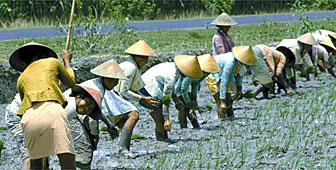Swiss company unravels rice genome

Scientists at the Swiss agrochemical company, Syngenta, have mapped out the rice genome, the first complete project of its kind in a crop plant.
The Basel-based company says it is a groundbreaking discovery which is likely to have a global impact on improved food and crop production.
The project was carried out at the company’s Torrey Mesa Research Institute (TMRI) in California.
Rice has been one of the key food crops attracting research from genetic scientists aiming to map genomes, partly because of its huge importance as a staple food for billions of people.
Syngenta said that because rice is a model for other cereals, it expected the knowledge gained from its rice genome map to lead to improvements in both rice and other food crops such as wheat and corn.
A genome contains the basic information that makes up living organisms, encoded in chromosomes made up of double-stranded chains of DNA (deoxyribonucleic acid).
Syngenta said it planned to use the rice genomics data for new commercial applications in agribusiness. But it added that it would collaborate with the academic community, allowing researchers and plant breeders to apply the data to advanced breeding methods.
The Swiss non-governmental aid organisation, Declaration of Berne, warned Syngenta against trying to patent the rice genome.
“We believe the rice genome, as the human genome, has to be in the public domain,” said spokesman, Francois Meienberg. “It is not possible that a company owns even a part of a genome, because it didn’t invent it. It’s part of nature.”
Critics have also expressed fears that mapping the genome of humans or plants will lead to attempts to alter the genetic make-up of organisms. The Declaration of Berne warns that genetically modifying plants brings ecological as well as socio-economical risks.
Syngenta was formed last year from the spun-off agribusiness activities of the Swiss chemical giant, Novartis, and its Anglo-Swedish rival, AstraZeneca. The rice genome project was carried out together with the United States company, Myriad Genetics.
by Vincent Landon

In compliance with the JTI standards
More: SWI swissinfo.ch certified by the Journalism Trust Initiative
You can find an overview of ongoing debates with our journalists here . Please join us!
If you want to start a conversation about a topic raised in this article or want to report factual errors, email us at english@swissinfo.ch.